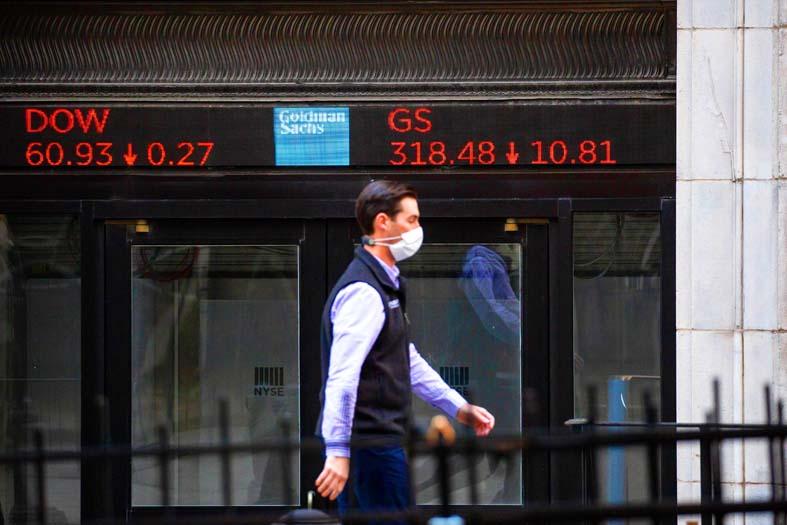Goldman Sachs Group Inc is seeing substantial demand for digital assets from institutions as it works to restart its cryptocurrency trading desk.
In a survey of nearly 300 clients by the firm, 40 percent have exposure to crypto, said Matt McDermott, global head of digital assets for Goldman Sachs Global Markets Division, speaking on a podcast.
The situation is different now compared with the 2017 bitcoin bubble, due to “huge” institutional demand across different industry types and from private banking clients, he said.

Photo: Michael Nagle, Bloomberg
McDermott confirmed plans reported last week for Goldman to restart its crypto trading desk, which he said would be “quite narrow initially,” with a focus on areas such as CME Group Inc futures.
He said that US banks need to cope with regulations that bar them from trading physical cryptocurrencies.
Cryptocurrency enthusiasts argue that digital tokens and the underlying blockchain technology are gaining acceptance among more mainstream institutions.
The derivatives market and new investment products have made digital assets more easily accessible. Some strategists posit that the asset class is a potential diversifier for portfolios, while others are more skeptical and blame speculators for inflating a possible bubble in bitcoin and other cryptos.
Bitcoin yesterday rose as much as 3.4 percent in Asia, while ether gained as much as 5.3 percent to the highest since Feb. 23.
Blockchain technology offers “a real diverse set of opportunities for the financial industry,” McDermott said.
As for prices, 76 percent of those surveyed see bitcoin ending this year between US$40,000 and US$100,000, McDermott said.
However, 22 percent expect it to end the year above US$100,000.

UNCERTAINTY: Innolux activated a stringent supply chain management mechanism, as it did during the COVID-19 pandemic, to ensure optimal inventory levels for customers Flat-panel display makers AUO Corp (友達) and Innolux Corp (群創) yesterday said that about 12 to 20 percent of their display business is at risk of potential US tariffs and that they would relocate production or shipment destinations to mitigate the levies’ effects. US tariffs would have a direct impact of US$200 million on AUO’s revenue, company chairman Paul Peng (彭雙浪) told reporters on the sidelines of the Touch Taiwan trade show in Taipei yesterday. That would make up about 12 percent of the company’s overall revenue. To cope with the tariff uncertainty, AUO plans to allocate its production to manufacturing facilities in

TAKING STOCK: A Taiwanese cookware firm in Vietnam urged customers to assess inventory or place orders early so shipments can reach the US while tariffs are paused Taiwanese businesses in Vietnam are exploring alternatives after the White House imposed a 46 percent import duty on Vietnamese goods, following US President Donald Trump’s announcement of “reciprocal” tariffs on the US’ trading partners. Lo Shih-liang (羅世良), chairman of Brico Industry Co (裕茂工業), a Taiwanese company that manufactures cast iron cookware and stove components in Vietnam, said that more than 40 percent of his business was tied to the US market, describing the constant US policy shifts as an emotional roller coaster. “I work during the day and stay up all night watching the news. I’ve been following US news until 3am

COLLABORATION: Given Taiwan’s key position in global supply chains, the US firm is discussing strategies with local partners and clients to deal with global uncertainties Advanced Micro Devices Inc (AMD) yesterday said it is meeting with local ecosystem partners, including Taiwan Semiconductor Manufacturing Co (TSMC, 台積電), to discuss strategies, including long-term manufacturing, to navigate uncertainties such as US tariffs, as Taiwan occupies an important position in global supply chains. AMD chief executive officer Lisa Su (蘇姿丰) told reporters that Taiwan is an important part of the chip designer’s ecosystem and she is discussing with partners and customers in Taiwan to forge strong collaborations on different areas during this critical period. AMD has just become the first artificial-intelligence (AI) server chip customer of TSMC to utilize its advanced

Six years ago, LVMH’s billionaire CEO Bernard Arnault and US President Donald Trump cut the blue ribbon on a factory in rural Texas that would make designer handbags for Louis Vuitton, one of the world’s best-known luxury brands. However, since the high-profile opening, the factory has faced a host of problems limiting production, 11 former Louis Vuitton employees said. The site has consistently ranked among the worst-performing for Louis Vuitton globally, “significantly” underperforming other facilities, said three former Louis Vuitton workers and a senior industry source, who cited internal rankings shared with staff. The plant’s problems — which have not